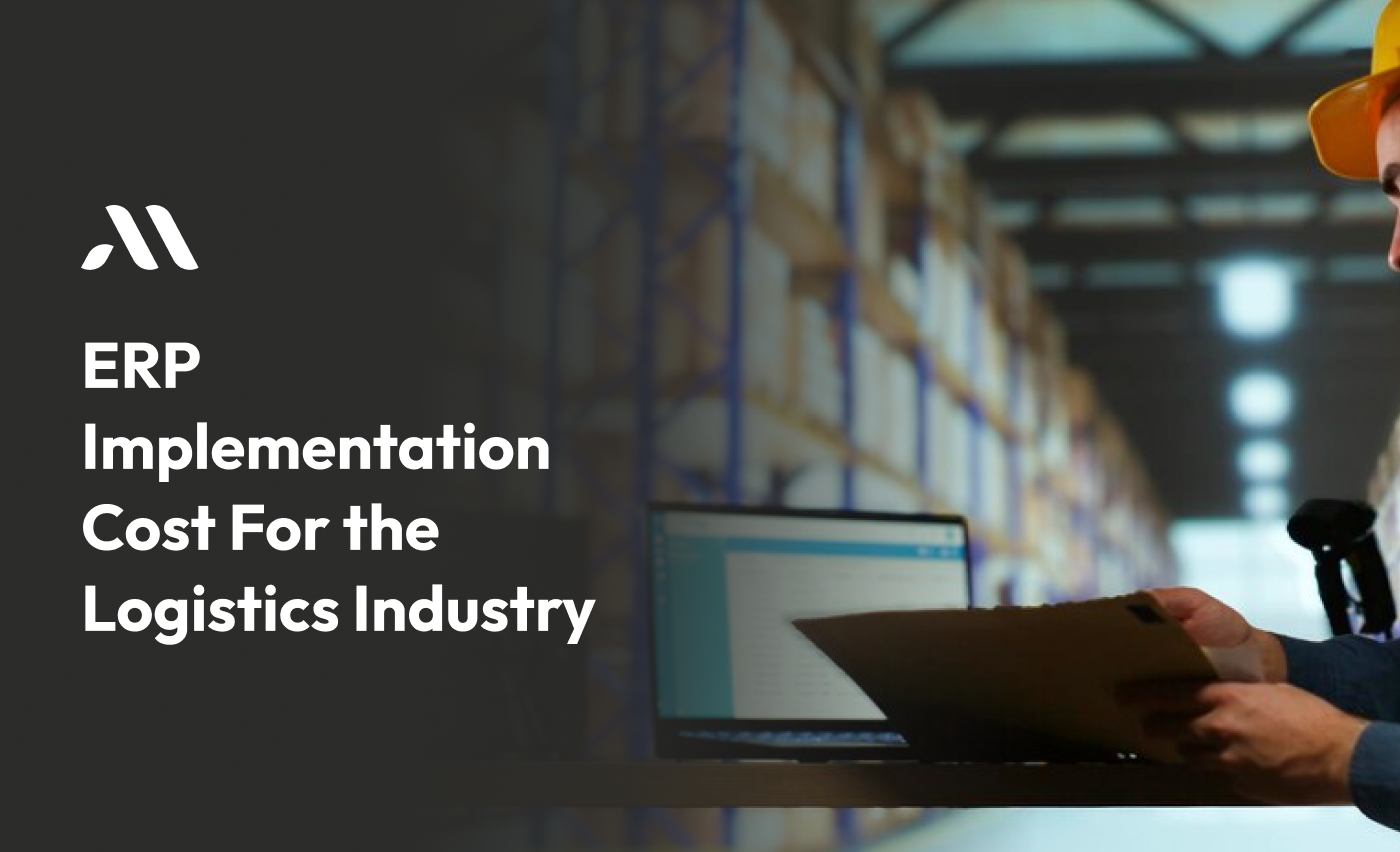The logistics industry is fast-paced, requiring the quick movement of goods and services to meet the needs of consumers and businesses. To manage the complexities involved, more and more logistics companies are turning to ERP (Enterprise Resource Planning) systems. However, before implementing an ERP system, it is important to understand the ERP implementation cost.
In this article, we will break down the ERP implementation cost for logistics companies. We will also discuss how custom ERP development by a custom ERP development company can impact the overall cost. This guide will help business owners make informed decisions.
- According to a survey by Grand View Research, the ERP market is expected to grow at a rate of 10% annually, reaching $71.63 billion by 2026.
- A study by Software Path shows that companies using ERP systems report an average 23% reduction in operational costs.
What is ERP, and Why Does Logistics Need It?
Before diving into the cost, let’s talk about what an ERP system is. ERP is software that helps manage different parts of a business, including inventory, accounting, human resources, and more. For logistics companies, ERP systems can simplify operations, reduce errors, and improve efficiency.
According to a recent study, companies using ERP systems have seen a 30% increase in operational efficiency. For logistics, this can mean faster deliveries, lower costs, and happier customers.
Factors Affecting ERP Implementation Cost in Logistics
Size of the Company: The size of your logistics company plays a huge role in determining the ERP implementation cost. For smaller companies, the costs will be lower because the system will be simpler. Larger companies with more employees, warehouses, and trucks need more complex systems.
Custom ERP Development: Many logistics companies opt for custom ERP development. This means creating an ERP system that is tailor-made for your company’s needs. While this might seem like the best option, it often comes with higher costs. Hiring a custom ERP development company can increase costs, but it also offers more flexibility and control over how the system works.
Number of Users: The more employees using the ERP system, the higher the cost. This is because the system needs to accommodate a larger number of users, which often requires more licenses.
Training and Support: Implementing a new ERP system means your employees will need training. The cost of training can vary based on how long it takes for employees to learn the system. Some ERP providers provide training and support, but it is an additional cost to consider.
Integration with Existing Systems: If your logistics company already uses certain software for tasks like inventory management or fleet tracking, you will need to integrate them with your ERP system. This can drive up the ERP implementation cost.
Customization: The more you customize your ERP system to fit your company’s unique needs, the higher the cost. This is where custom ERP development can be both a blessing and a challenge. It provides a system that works exactly how you need it to but can significantly increase the ERP implementation cost.
Make sure to consider all hidden costs like training, support, and maintenance when calculating your budget.
Breakdown of ERP Implementation Cost
The ERP implementation cost can vary greatly depending on several factors. Here’s a general breakdown:
Software Licensing: This is the base cost for using the ERP system. For small to medium-sized logistics companies, this cost can range from $10,000 to $100,000 per year.
Custom ERP Development: If you opt for a customized solution, expect to pay more. The average cost for custom ERP development can range from $50,000 to $500,000 or more, depending on how complex the system is and how many custom features are required.
Implementation Services: This includes the cost of setting up the ERP system, migrating data, and configuring it to meet your needs. This cost can range from $20,000 to $200,000.
Training and Support: Training employees can add another $5,000 to $50,000 to the total cost, depending on the number of users and the level of support needed.
Maintenance and Upgrades: After the system is up and running, you’ll need to maintain it. Annual maintenance costs are usually around 15% to 20% of the initial ERP implementation cost.
Tips to Reduce ERP Implementation Cost
Here are some useful tips for business owners in the logistics industry to reduce the ERP implementation cost:
Choose a Scalable ERP System: Opt for an ERP system that can grow with your company. This will prevent the need to switch to a new system as your company expands.
Limit Customization: While custom ERP development offers many benefits, limiting custom features can save money. Focus only on the features that are necessary for your business.
Consider a Phased Implementation: Implementing the ERP system in phases rather than all at once can help spread out the cost and give your team time to adjust.
Work with a Reliable Custom ERP Development Company: Choosing the Right Custom ERP Development Company can make all the difference. Look for a company that has experience in the logistics industry and can offer you the best solutions within your budget.
Remember: ERP implementation cost is an investment that will pay off in the long run. According to Panorama Consulting, 95% of companies that implemented ERP systems saw improvements in their processes.
Notes on Working with a Custom ERP Development Company
If you decide to go the custom route, working with a custom ERP development company can be a game-changer. However, not all companies are the same, and it’s important to do your homework. Ask potential development companies about their experience in the logistics industry, their approach to ERP implementation, and their ability to provide ongoing support.
A good custom ERP development company will help you create a system that is scalable, easy to use, and tailored to your specific needs.
Also Read - ERP vs CRM: What Does Your Startup Need?
Benefits of Investing in ERP for Logistics
While the ERP implementation cost might seem high, the benefits far outweigh the initial investment. Here are some key benefits:
Improved Efficiency: An ERP system helps logistics companies manage everything from inventory to shipping schedules in one place. This reduces errors and speeds up operations.
Better Decision-Making: With all your data in one place, you can make informed decisions about things like fleet management, warehouse operations, and more.
Cost Savings: While the upfront ERP implementation cost can be high, over time, the system will help reduce labor costs, errors, and inefficiencies, leading to savings.
Conclusion
In conclusion, the ERP implementation cost for logistics companies can vary depending on factors like company size, customization needs, and the number of users. While the cost might seem high, the benefits in terms of efficiency, decision-making, and cost savings are worth it. Whether you opt for a ready-made solution or work with a custom ERP development company, investing in ERP will help your logistics business thrive in today’s competitive market.
Looking to streamline your logistics business with a custom ERP system? MicraSol is here to help! We specialize in app development and custom ERP solutions customized to your needs. Boost efficiency and cut costs with our expert team. Contact MicraSol today and get started on your ERP journey!
By considering factors like customization, training, and integration, you can ensure that you get the best value for your ERP implementation cost. Remember, choosing the right system and the right custom ERP development company will save you money and help your business grow.
FAQS
How much does ERP implementation cost for a logistics company?
The cost depends on the size of your company, the number of users, and whether you choose a standard or custom ERP system. Generally, ERP implementation can cost anywhere from $50,000 to $500,000 or more.
Why is ERP important for logistics companies?
ERP helps logistics companies manage their operations more efficiently. It reduces mistakes, speeds up processes, and helps businesses save money in the long run by improving workflow and decision-making.
What is custom ERP development?
Custom ERP development means creating an ERP system designed specifically for your company’s needs. While it may be more expensive than standard ERP solutions, it gives you more control and flexibility in how the system works.
Can I reduce the cost of ERP implementation?
Yes! You can reduce costs by limiting customization, choosing a scalable system that grows with your business, and working with a reliable custom ERP development company. Also, consider implementing the ERP in phases to spread out the cost over time.
How long does it take to implement an ERP system?
ERP implementation usually takes several months, depending on the complexity of the system and how much customization is needed. It could take 6 to 12 months or even longer for very large projects.








